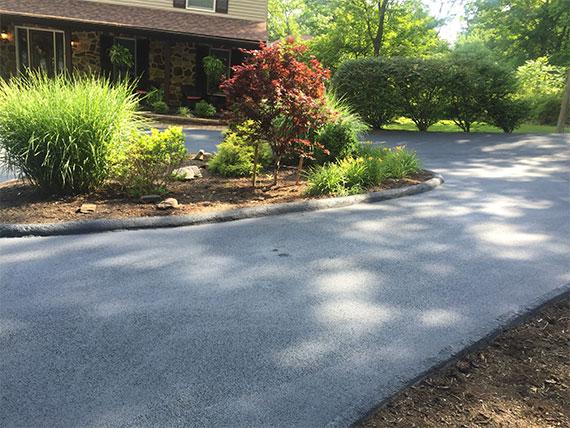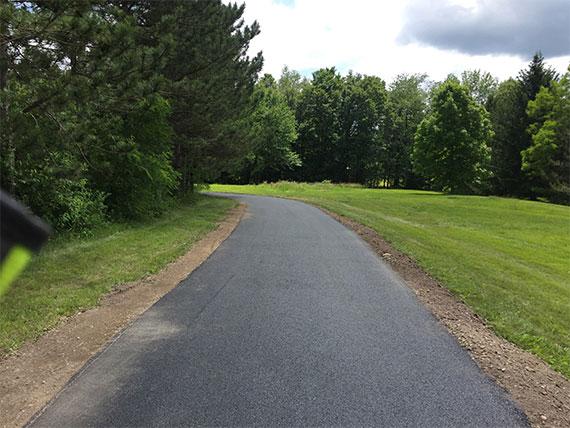
Quality Asphalt Sealing & Line Painting Services You Can Rely On
Trust J.W. Fleming for Quality Asphalt Maintenance Services
- Paving
- Seal Coating
- Sealing
- Parking Lots
- Driveways
- Roads


Discover More about Asphalt Spray Sealing
How Does Your Asphalt Start Cracking?
After being exposed to sunlight for a long period, your asphalt driveway begins losing its flexibility. More specifically, the sun’s ultraviolet rays cause the asphalt cement to break down. The mixture of the asphalt and the stone particles and sand, also known as aggregate, start to come apart. If you live in colder climates, the asphalt cracking process is sped up.
How Do Asphalt Sealers Work?
Applying an asphalt sealer to your driveway, will not only make it look nicer, it will also increase its lifespan. Asphalt sealers provide a shield for your driveway making the elements impenetrable to it. If you have any questions about our process or how sealers work, please give us a call today and we would be happy to answer all of your questions.
Which Sealer Should you Choose, Traditional or Coal Tar?
Traditional
- Usually mixed with an emulsifier (a soapy substance) and water
- Very short lifespan
- Doesn’t protect against ultraviolet rays
- Cheap
Coal Tar (Our Preferred Method)
- Consists of emulsifier and small particles of clay making it easy to apply
- Longer lifespan
- Effective against oil and gasoline, protects against UV rays
- Cost efficient
How Often Should You Apply Sealant?
For newly laid asphalt:
J.W. Fleming, like most Asphalt Experts, recommend applying a premium sealant ONE year after installation. This is a fair ‘rule of thumb,’ as asphalt consists of specific oils that remain malleable until all the oils evaporate. Usually, the asphalt does not reach this point until it fully cures. This curing and hardening process typically takes 10-16 months, depending on inclement weather and altitude.
For aged asphalt that has already been sealed:
Only apply a new coat of sealant once the previous one has worn out. A good ‘rule of thumb’ is roughly every three years. Of course, this varies a bit due to weather conditions and sunlight exposure. If your asphalt begins to develop a grayish color, it might be time to add a new coat of sealant, as this is a sign of oxidation, which leads to the breakdown of the asphalt.
When to Best Apply Hot Tar Crack Repair
When asphalt surfaces start cracking because of sun/ultraviolet ray and weather exposure, it loses flexibility and can crack. Once the surface flexibility breaks down, small cracks can appear. Over time, the mixture of the asphalt and the stone particles and sand, also known as aggregate, start to come apart. The cracking problem can lead to wider breaking if these cracks remain unsealed. Colder climates can speed up the asphalt cracking process.
Once the Paving is Done, Time to Do Line Striping
Once the paving project or sealing is done, count on J.W. Fleming, Inc. to do a professional job with line striping. Your parking lot would not be complete without bright, easy-to-read lines and symbols for your patrons. Keeping the lines on the parking lot painted are like keeping the trim on your building painted. It makes a good impression, and shows that you care about your business.
J.W. Fleming professional asphalt sealing crew has years of experience providing quality services:
- Use only Federal specification RP-355c Commercial Grade coal tar emulsion sealer
- Professionally trained and experienced staff always sprays everything, and never squeegee
- Staff utilizes and Ingersoll Rand 1500-gallon spray tank truck Spray in 6’-8’ spray pattern for even coverage and durability
- Proven experience at prepping and filling cracks better than anyone in the area
- Use high-pressure to prep and clean the crack prior to applying material
- Professionally trained and experienced staff takes care of everything from prepping the lot to final inspection
- High-quality paving, sealing, and seal coating for roads, driveways, and parking lots.
